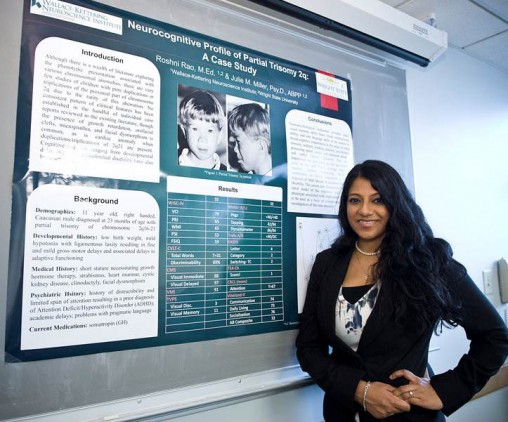
Graduate student Roshni Rao’s research led to recommendations for useful interventions for children with a rare genetic disorder.
It was a very rare case. An 11-year-old boy was suffering from a genetic developmental disorder resulting from triplication of part of his second chromosome. It hampered his motor skills and made it difficult for him to communicate, make friends and care for his personal hygiene.
The case fell into the lap of Roshni Rao, a graduate student in Wright State’s School of Professional Psychology. What she did with it promises to send ripples through the field of child neuropsychology and help families, schools and health professionals understand this genetic disorder within children much better.
The child was a patient of Julie Miller, a board-certified pediatric neuropsychologist at Wallace-Kettering Neuroscience Institute in Kettering, Ohio. Miller and Rao conducted a battery of neuropsychological tests with the boy and came up with a profile. Their research broke down all of the boy’s skills within different domains, including memory, attention and adaptive skills.
“The nice thing was that he had a lot of strengths. That was the exciting part,” Rao said. “He will be able to succeed with some help.”
Miller and Rao proposed potential areas of strength for children afflicted with the disorder such as visual memory, visual constructional skills like drawing and copying, and basic verbal skills based upon this child’s profile. They then crafted recommendations on how to provide useful interventions, primarily within his educational setting.
In February, Rao presented her research as lead author at the International Neuropsychological Society conference in Seattle, which attracted hundreds of neuropsychologists and researchers from around the world.
“A lot of the professionals at the conference came up to me and said, ‘I’ve been seeing these rare forms of genetic disorders and I’m not really sure what to expect.’ This was a nice way to propose what one might expect,” Rao said.
During the conference, the editor of the Clinical Neuropsychologist, a major journal in the field, approached Rao and asked her to write up her research findings for publication so they can be used as a reference. Miller and Rao are planning to work with a geneticist to produce a case study for publication.
“There are only a handful of studies in the literature that examine partial trisomy in this specific location on chromosome 2,” Rao said. “That’s the significance of our research and what is so exciting about contributing this information to the field.”
“The ultimate goal is to improve the lives of children and their families affected by disabilities,” added Miller. “Individual case studies where relative strengths and weaknesses can be identified are an essential starting point.”
Rao grew up in Tampa, Fla., the daughter of a cardiologist and a research chemist. When she was a pre-med student at Case Western Reserve University in Cleveland, she took a child psychology class from a doctoral student who was teaching a class on hospitalized children. Rao fell in love with clinical child psychology.
“For me it combined everything that I wanted,” she said. “It had that human element. It had a lot of intervention. It had all the pieces of solving this puzzle of piecing together both strengths and weaknesses of the child. It also had the piece of being able to work with medical and developmental disorders.”
Rao pursued her master’s degree at Vanderbilt University in Nashville, working under a faculty member who specialized in children with autism, a disorder of neural development characterized by impaired social interaction, verbal and non-verbal communication and repetitive behavior.
At Vanderbilt, Rao designed a way to help hospitalized children with neurodevelopmental disorders by using visuals and teaching nurses and other caregivers how to use them. For example, in order to reduce their anxiety, the children were shown videos of clinic procedures such as how blood pressure is taken.
Rao arrived at Wright State and SOPP in 2012, beginning work on her doctorate.
She wants to eventually work at a children’s hospital, helping children with neurodevelopmental disorders and disabilities. She also wants to become an advocate for them. She is currently advocacy chair of the Ohio Psychological Association of Graduate Students.
“The exciting thing is that when you assess and intervene with these children, you see where they need help and can provide them with recommendations on how to get that kind of help,” she said. “And they do make gains and have their own unique strengths that contribute to society and are influential in our world. I see potential in all of these children.”
Rao, who works in SOPP’s clinic at the Duke E. Ellis Institute for Human Development in Dayton, says the favorite part of her academic career right now is conducting feedback sessions with family members following the diagnosis of their child.
“Usually they are very nervous. It is really stressful for parents to parent children with disabilities and many parents come to psychologists because they don’t know what to do,” Rao said. “When you show them the child’s strengths and give them the tools, they feel competent. They feel empowered and the child feels empowered.”

 Wright State names Rajneesh Suri dean of Raj Soin College of Business
Wright State names Rajneesh Suri dean of Raj Soin College of Business  ‘Only in New York,’ born at Wright State
‘Only in New York,’ born at Wright State  Wright State president, Horizon League leaders welcome new commissioner
Wright State president, Horizon League leaders welcome new commissioner  Wright State celebrates homecoming with week-long block party
Wright State celebrates homecoming with week-long block party  Wright State baseball to take on Dayton Flyers at Day Air Ballpark April 15
Wright State baseball to take on Dayton Flyers at Day Air Ballpark April 15 